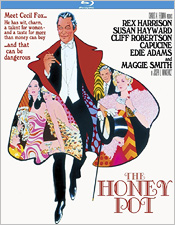Honey Pot, The (Blu-ray Review)

Director
Joseph L. MankiewiczRelease Date(s)
1967 (September 8, 2015)Studio(s)
United Artists (Kino Lorber Studio Classics)- Film/Program Grade: A
- Video Grade: B+
- Audio Grade: B
- Extras Grade: N/A
Review
Writer-director Joseph L. Mankiewicz set an Oscar record when he became the only man in history to win consecutive Academy Awards for both writing and directing – he picked up two bald swordsmen in 1949 for A Letter to Three Wives, and another pair the following year when he wrote and directed the brilliant and hilarious All About Eve. Throughout the 1940s and 1950s, Mankiewicz’s films, particularly those he wrote (though he did okay with another fellow named William Shakespeare’s script when he directed Julius Caesar), represented a special brand of adult entertainment. Literate and complex but rarely showy, they were the perfect expression of their erudite author’s sensibility, which was almost as rare then as it is now.
Although, for my money, Mankiewicz never stopped making great movies, by the mid-1960s we was a bit on the ropes, having been seduced by a gargantuan paycheck into directing 1963’s Cleopatra. Although, contrary to popular belief, that movie was a hit, it was also the most expensive of its time (well north of $300 million in today’s dollars), and out of control in ways that deeply offended Mankiewicz’s refined tastes. The film was recut against his wishes, and the whole experience soured Mankiewicz so horribly that he could barely speak of it, even when he was interviewed decades later.
Needing to get back to basics, Mankiewicz chose an unusual follow-up project in the form of The Honey Pot (1967), a sort of meta-adaptation of several sources that has the kind of self-referential quality that directors like Tarantino and Spike Jonze would employ (to far greater success) decades later. An adaptation of a Frederick Knott play that was itself an adaptation of a Thomas Sterling novel, which was in turn inspired by a Ben Jonson 1606 play, the film’s ostensible story is of a wealthy charmer (Rex Harrison) who decides to play a prank on several former lovers by pretending that he is on his death bed. Knowing they will all scavenge to get at his presumed riches, the ladies’ man constructs an elaborate ruse with the help of a young actor (Cliff Robertson) and sits back to watch the comic complications that ensue. He doesn’t count on the women’s greed leading to murder, but it does – and then things get really complicated.
The plot is incredibly twisty and intricate, and in Mankiewicz’s original conception there were layers upon layers of self-conscious commentary; aside from the Harrison character’s own ironic narration, there were to be scenes in which other actors broke character to discuss the plot, and a series of intrusive memos from supposed studio executives commenting on and critiquing the film. A good deal of this was removed from the film by its financiers by the time it made its way to the screen, but a good deal remains – watching The Honey Pot today, one marvels at how sophisticated and modern it feels, while still retaining Mankiewicz’s classical sense of craft. The movie constantly pulls the rug out from under the audience, upending our expectations and forcing us to regain our bearings, but it never feels chaotic or confusing because Mankiewicz’s sense of control over his medium is so complete. Although he more or less disowned the film following its release, it’s an undeniable classic – whether or not it’s the classic Mankiewicz intended.
Kino Lorber has released the 132-minute cut of the film in a fine new Blu-ray edition that allows new audiences to discover this underrated gem. Allegedly the original theatrical cut was 155 minutes before United Artists pulled it from theaters and cut it down (undoubtedly a source of Mankiewicz’s displeasure), but this is the most complete edit I’ve come across on home video. The transfer is the best I’ve come across too, with sharp detail and vivid color reproduction, though there are occasional mismatches in terms of contrast and hue that seem inherent in the source material. The stereo sound mix gets the job done too, with excellent clarity in terms of dialogue and a strong presentation of effects and music – maybe a little too strong in terms of music, in fact, as the score occasionally seems loud out of proportion to the rest of the mix. Overall the release is totally commendable, though there’s nothing in the way of special features – just a theatrical trailer.
- Jim Hemphill

